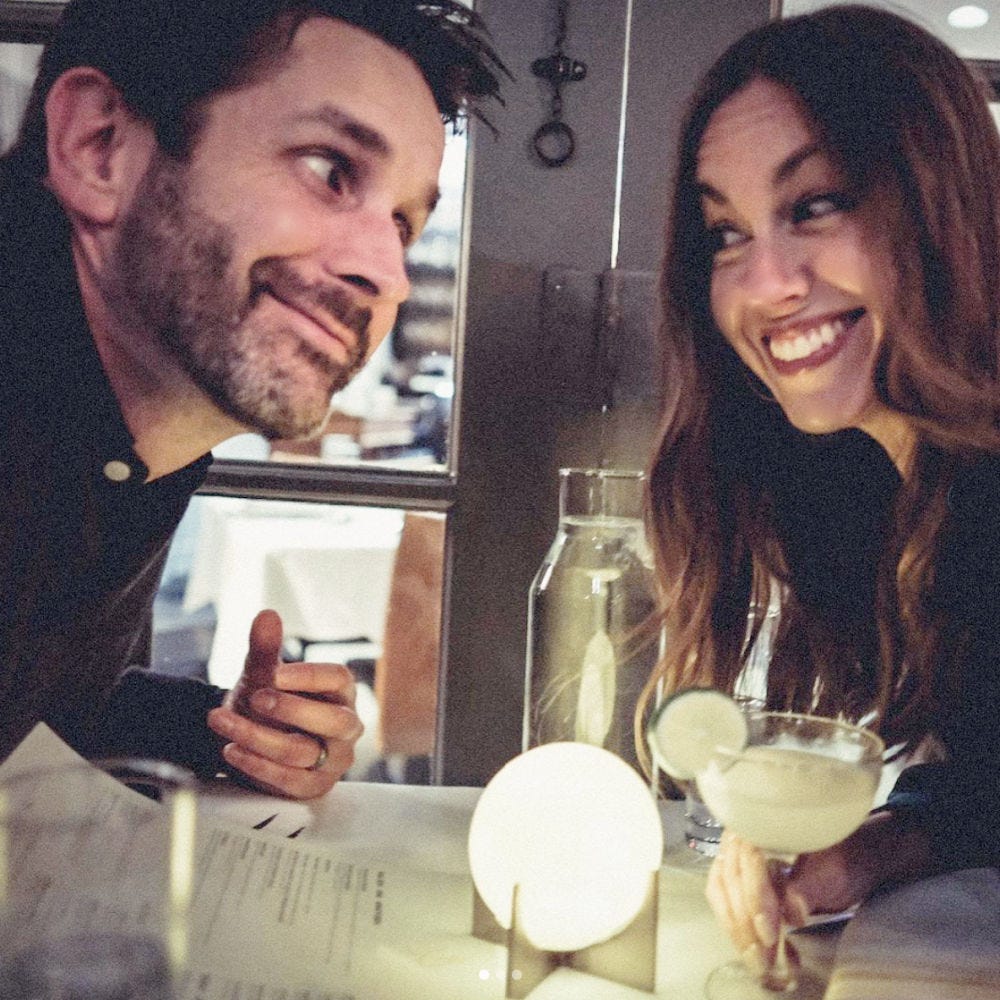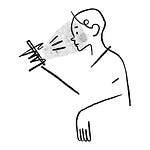Tsh was on a crazy-tight book deadline this week, so in this episode, Seth is talking to none other than his wife Amber! She shares her morning routine when the day’s going well: daily examen, prayer, poetry, and the things she does to get her creative juices flowing. If you need some inspiration for your own morning routine and you’re hankering for a good old-fashioned Southern drawl that makes you smile, you need this conversation.
Amber: Newsletter | Twitter | Instagram | Website
Seth: Newsletter | Twitter | Instagram | Website
Tsh: Newsletter | Twitter | Instagram | Website
Survival is a Style: Poems, by Christian Wiman
Ophelia, by Roo Panes
Support the show — buy the next round of drinks!
Subscribe to the show’s Substack
Tsh’s Rule of Life workshop
Scroll down for the transcript.
Seth: Welcome to A Drink With a Friend, I’m Seth Haines. Today, I do not have Tsh Oxenreider here because Tsh is working diligently to finish a book.
Instead of Tsh today, I have asked my lovely wife, Amber Haines, to join me. Amber is wonderful, beautiful, the mother of my child, also an amazing writer, and human being in general. Amber, welcome to A Drink With a Friend.
Amber: Thank you. I’m happy to be here.
Seth: What are you drinking today?
Amber: I have had enough coffee this morning to fuel a tug boat so I’m drinking OM Mushroom Hot Chocolate. I know that probably sounds super gross but I have this thing where I want to eat mushrooms every day because I believe in the power of mushrooms [laugh].
Seth: Wait. What kind of mushrooms? I don’t understand.
Amber: I believe all edible mushrooms are powerful but I only have Lions Mane or Reishi or different…things that help with…not magic mushrooms.
Seth: Not those kinds of mushrooms.
Amber: No.
Seth: I’m glad to hear that when I go to work you’re not sitting at home sipping on magic mushroom juice.
Amber: You would know if I did that.
Seth: That would be awkward. That’s probably true. You’d be seeing double rainbows.
Amber: Maybe.
Seth: I’m in the office, which means I have a Keurig and as blasphemous as this sounds, I’m drinking Starbucks from a Keurig. If you listen to the show very often you know that I’m a bit of a coffee snob and this is truly terrible coffee. I’m not going to lie. That’s where I am this morning. You are in a much better place.
Amber: It’s fine. You just keep going.
Seth: Today, on A Drink With a Friend, what we wanted to do is talk a little bit about the morning and morning creativity. In particular, and I thought there’s no better person to talk to this about than you because you’ve really done a good job over the last little bit of really trying to guard your morning times and do good morning work and over the last little bit, I have not. I have been lazy. Getting up late and not doing my creative work and having a hard time getting into my morning peaceful space. I wanted to talk a little bit about that this morning and I want to talk a little bit about what you do. Walk me through our morning routine as if I need to walk through that. Walk the listener through our together morning routine.
Amber: Okay. Just to be clear, I’m normally lazy. I have always struggled with sleep, with getting enough sleep, so even if I have enough hours in the bed, I’m awake. When I got Covid at the end of February, my body undid all the sleep patterns that I gained. On the back end of Covid, I ended up waking up every morning at 3:35 a.m. This has enhanced my writing time. I don’t have a choice. It’s put me back in the rhythm that I don’t exactly love but my old rhythm was to work to wake up pretty early. We like the house still and dark. We go to separate places because if we don’t, we end up chatty and I also end up being house administrator and asking Seth, did he deposit a check that has nothing to do with what we need to be doing at that time. This has not been going a long time for me. My morning discipline has changed dramatically. I went through a couple of years of prayer being completely dry. My writing being more like, I went on a walk yesterday, saw a flower, then I took a kid to the dentist. I couldn’t get anything, I couldn’t find my voice. This season, especially through Lent, has been especially because I have found myself in prayer again and that always involves journaling and an initial creative dump, making connections, and really a loose examen of yesterday. Have you guys talked about doing an examen?
Seth: I think we’ve talked a little bit about it, but why don’t you, as you said, a loose examen. That’s different than a formal examen, so why don’t you explain what your loose examen is.
Amber: What an examen is where you actually examine your life. I look to the past twenty-four hours and I make little notes about how those moments felt. If a particular moment stands out to me, then I will settle there and ask the Spirit questions about that moment and the feelings that I’m feeling and maybe what’s underneath that. I imagine a table between me and the Lord and I’m putting what I can see on the table and then I want to talk about what’s on the table a little bit. I try to see what emotions are attached to those things. There’s always something deeper to dig through with the Lord in that. Before I get to that examen part, my spiritual director led me to this, taking three deep spiritual breaths. I will start with what feels like the beginning of meditation where a lot of times meditation is empty your mind, but I start with these deep breaths to invite the Holy and to release the things that are blocking my prayer. I’ve already invited the Lord to be with me and in my thoughts and to lead me as I journal through my examen and then whatever passage that I’m going to look at today. I’ll do a little jotting of an examen. I don’t spend a ton of time on that unless I’m just really going somewhere deep. A lot of times my examen ends with a question that I don’t know the answer to. Often, the passage of scripture that I have before me is really short but something in that will stand out to me, and then I will go from there to journal more and it is actually rare that it doesn’t have something to do with the question that I ended within my examen.
Seth: You start with an examen. Then you move into your prayer practices and often you find the connection in your examen and your prayer practices. Is that okay?
Amber: Yeah. It ends up feeling like a conversation and in the midst of that, I try to have the practice of sitting in silence. I am an avid, voracious journal-er when I’m in the practice. I can write twelve pages in a morning and I have to work really hard to be silent and listen.
Seth: And that’s part of your prayer time, the silence, sitting in the silence.
Amber: Yes. I usually do better when I have a question that I’m seeking an answer for, even if the question is what do you want me to hear today? Then I journal that out, too.
Seth: Before we move into the creativity part which then is your third movement. I know, because I live with you and I watch it happen most mornings. Tell me this, not everyone here that listens shares the same faith system or the same system of belief, so when you start with your examen or when you move into prayer, do you think, do you know, have you talked to anyone, could anyone adopt these two movements as a way of beginning a day?
Amber: Absolutely. But…it is an actual practice. And it is a thing that I have been terrible at, according to my season of life and particularly if I’m in a more survival-ly season or in a season of healing. I have had seasons where I could not engage my imagination. I believe that we have to have an imagination, and I don’t me, let’s pretend Jesus is real. I don’t mean that at all. There is something to reading a passage of scripture and being able to imagine it and asking which character you play in that story and thinking through the eyes of the man who was healed from his blindness. Sometimes my imagination isn’t there. I’m shut down. Survival mode does that to me. I’ve tried to learn to celebrate what is and what I can do and there have been seasons that just praying a rote prayer was all that I could do.
Seth: You start with your examen. You get quiet. You look over the past of your day, and I would say that someone who doesn’t have any particular faith could still do this, you can still sit down and look over the course of your day and say here’s what I’m grateful for, here are the things that I saw that were beautiful, here are the things that I saw that were good, here are the true things that I saw and journal those down, write them down really quickly. I think you’re right, regardless of whatever, when you begin to examine your day, you’re going to come up with certain questions, certain things that you need to explore. Things that you need to ask about. For you, you move into prayer. For me, I move into prayer. I know Tsh moves into prayer. For someone else, it may be a contemplation. I may be just sitting and asking that question and ruminating on that question and trusting and believing that the good, true, and the beautiful, that the divine that is in the world will speak to you and will help answer those questions. For us, it’s through scripture. When you move from examen and into prayer and you have this season of good imagination, where you’re able to really connect with the scriptures, really connect with prayer, really connect with the truth that is ongoing and eternal and almost elastic, it stretches from one end to the other, then you make a really particular move into something that is like creativity. Talk to me about your morning creativity. This is your routine to prime your creativity.
Amber: I love to be inspired. A thing that I have had to guard against in prayer or in my journaling is to seek that time for the purpose of being inspired. I actually want to seek that time for the purpose of being with the presence of all-powerful love and knowing that love. I have found that distinction to be really important to me, that I’m not trying to get, I’m not having a meeting with God so I can get something good to go right.
Seth: He’s not a vending machine for me.
Amber: Right. I actually do that, so I’m having to guard against that. I will read and it usually is reading that is the spark for me. Sometimes, as I go about my day, it’s music. In the morning, it’s reading. On my good days, I read a chapter and I read a poem. Usually, that’s it. I will do a more creative free-write. Like people who talk about morning pages, just write what comes out, and usually, that will inspire the writing that I have to do that day.
Seth: This is also an appropriate time to tell the listener that we have two dogs, Lucy and Tippa and you may hear them in the background, I’m really sorry about that. They get pretty rambunctious when people start walking, they feel like they have to guard our house from every passer-by. It is quite annoying. If you hear two little dogs in the background, those are our dogs. They’re great.
Back to what you were saying. I totally understand the idea of spiritual reading for the purpose of inspiration, particularly as a writer, that’s something you always have to be on guard against. You don’t want to be using God. You don’t want to be using spiritual reading as a way to platform, for lack of a better word. It truly is a practice for us, for our own spiritual growth. Then you move into your creativity and I really like what you’re saying that you typically like to read, or you try to read, one chapter and one poem. Tell me what chapter and poem has really stuck out to you in the last couple of weeks.
Amber: Christian Wiman has a new book of poetry called, Survival is a Style. That’s the book that I just finished. The final poem, I would read it right now if it weren’t such a culmination of the whole book and it would feel like cheating, telling the punch line.
Seth: A spoiler.
Amber: A little bit. A spoiler. It’s gorgeous and completely heartbreaking. The whole book is heartbreakingly beautiful. One of the most human things I’ve ever read. It’s not every single poem. In fact, some poems, ehh. Then I go back and read it the next day because I didn’t really feel it or get it and then it slams me. Poetry is a thing that keeps on giving.
Seth: Christian Wiman is also the master of that. I don’t really understand that the next day being, oh my gosh, I totally understand that, and now I’m on my face.
Amber: It’s a really good book. I tend to sit with a book of poetry for a really long time. I’ll read it and reread it. I’ve had three books of poetry by my bed for a year. This one is new and I gobbled it up. The chapter. I am reading Heather King’s, Redeemed. I don’t know when this was published. I think maybe in the 90s or early 2000s.
Seth: We have been talking a lot about Heather King on this podcast. We’re like apologists for her.
Amber: She speaks my language. This was published in 2008 with Viking Penguin. Good gravy. She is amazing. She has, chapter 3 in this book is what I read today. It was just about her coming to faith and I could have written every word of it. I do wish I could just read this to you guys. It’s so great.
Seth: Read a passage from it. What stuck out to you? What has stuck out to you in that book?
Amber: Here’s the first sentence, “When I first started writing, I was aflame with the notion that finally, finally, I would create. What I didn’t realize was that writing would create me.” Boom.
Seth: That’s ridiculous.
Amber: This is paragraph two, “Flannery O’Connor wrote for four hours a day so I figured I’d do the same. Right from the beginning, writing for me, was a religious experience.” Boom. She writes in this chapter about how writing awakened her soul. She had been visiting all of these churches and just never found a fit. She felt this ache and emptiness like she needed to be somewhere, like a lot of us do right now. She was saying that writing led her to her deepest self. She walked into a Catholic Church that she had passed a bazillion times and she said, “I remember instinctively understanding that here was consecrated time, consecrated space. That the people who had come to worship in the middle of the day were kneeling, standing, praying, were part of a parallel universe that intersected with eternity.” To me, that so connects with the practice of writing because for people who are true writers, poets, whatever, journalers, I think we do find that parallel universe that intersects with eternity. To me, that’s what poetry is, is bringing this cross-point between the visible and invisible. I love how she connects her coming to know this deeply human God, Jesus, as someone that she felt like she was falling in love with and someone who understood her and that that parallels with her writing, her practice.
Seth: The thing I love about King’s writing, too, is that I feel like her every care, every piece of her ego, I feel like it’s all been stripped down and what you get in her writing is really the barebones of creativity. I love that about her. I don’t sense a whiff of ego or showmanship or even as Mary Karr would put it, decoration. You gotta love Mary Karr, don’t you? For you, you move from examen to prayer, and then you do some reading. You read creatively. Is this a prime the pump thing?
Amber: Yes.
Seth: That was a very easy answer, yes. Yes, is the answer to that.
Amber: [laugh]
Seth: You can tell our conversation at home is very utilitarian. Once we get past the reading, what’s next? What’s next for you? On a good day.
Amber: On a good day, I grab my computer and I start typing. If things still feel really muddled, then I grab my journal again and start journaling, just whatever comes out.
Seth: How often would you say things still feel really muddled? I think this a really important question because I think one of the things that really important about what you just said is that things still remain muddled a lot for all kinds of people. Whether you’re an artist looking at a canvas or a photographer or a writer or whether you really like accounting spreadsheets, which if you do, that’s crazy but whatever. I think there are a lot of times when we turn to our output and things are just really muddled. Tell me how when you’re in your muddled experience. How does the journal help? What does that do for you?
Amber: I don’t put the same restrictions on myself when I’m journaling. I’m really sloppy. I scribble. My handwriting probably looks like a crazy person. I draw lines and circles and that kind of thing because I’m trying to get to the nugget or to what’s underneath, what feels muddled. I’m not afraid of the muddled feeling anymore because it all feels like it’s coming to something like I’m building. I get things on the page and a lot of times a little bit of that will become what goes on to the screen tomorrow. Even the question that comes out of that is really important. Nothing feels lost. I’m still doing the work of writing but I muddled a lot. I am in a season of deep renewal and healing. A lot of what I’m doing as I’m relearning how to hear the voice of God is relearning how to hear my own voice and part of that is the practice of writing that isn’t for other people’s eyes. It feels really important. It feels good. It doesn’t produce. I’m not churning out content for people to see but I believe the fruit is coming to be.
Seth: There is some content that you “churn” out. People can find you on Instagram writing things. People can find you in your newsletter writing things. I don’t sense, maybe I’m biased, I don’t sense that you sit down to write for the purpose of gaining followers or for the purpose of saying the next inspirational thing on the Internet or for the purpose of getting a book deal. I sense with you that writing is very, very much a way for you to explore who you are, how you connect with God, how you experience and see the world around you, and how you make sense of it.
Amber: That is true. But also, a lot of times when I’m working through my own stuff, I’ll actually move from writing, “I” to “we”.
Seth: What do you do that?
Amber: I am thinking about my readers. I really do. I have come to love these people and I think, in the few conversations that I get to have, I understand that there is a lot of pain right now. I feel that with people and I do feel like as I receive encouragement that I want to articulate that encouragement. I actually do have a feeling of this is a thing that I need to share. Then I have also the feeling of maybe I need to use discretion here, this isn’t a thing to share yet. Even if I’m writing for the “we”, for us, it’s a not yet. It’s still developing.
Seth: What are the things in your writing right now that you sense people need? You say you move into the “we”, what do “we” need right now?
Amber: Gracious. Can I read one more little thing from Heather King?
Seth: Absolutely.
Amber: “The small hidden anonymous God I found in the gospels appealed to me deeply. It was the God I’d found in sobriety who worked through other people. Who had a sense of humor. Who held me accountable and forgave me at the same time. Who didn’t force or judge, just invited me to do a little better then put the challenges in my path to teach me how. Christ subverted all worldly systems, political, familial, financial, not for the sake of being subversive but because acting with utter integrity is automatically subversive. He was left of the furthest left and right of the furthest right. Both radically liberal and radically conservative.” This paragraph goes on to be totally amazing. This idea of the radical left and the radical right, I feel like there is such deep pain and families tearing apart in the midst of division and polarization in our country. I think that a lie that we’re hearing is that there is no bridge between these two worlds of left and right because we don’t hear those voices. The voices of who are like let’s build a bridge between the two. I’m not assuming that I can build that bridge but I do imagine that there a lot of us on that bridge and we need to find a way to talk to one another in the space. I think there’s a lot of pain in the middle.
Seth: In what you just read, it reminds me of the passage where we’re told not to be lukewarm, to be hot or cold. It’s this idea that there is some goodness that exists in both camps on the extremes and there’s also some real sickness that exists there and right now it’s really hard to be in the middle because you've not left enough for the people on the left and you’re not right enough for the people on the right. Ultimately, there needs to be some identification with the good of both sides and not throwing out the baby with the bathwater on both sides. Is that what I hear you saying?
Amber: Yes, sort of. But also, Jesus is completely other than the left or the right. That’s more what I’m saying. That is not finding the middle between the two. There are some things that we cannot reconcile. Jesus is other. His was is so far left and so far right. It can’t be defined by a party. There are so many people who feel like I can’t be defined. I’m not hearing my voice, my thinking, my feelings in either of these very loud spaces. I’m not identifying in either place and I’m lost and I don’t have a people. That brings up a whole can of worms. Jesus is other. Jesus loves all. Jesus speaks the truth in the midst of all of that mess. Gently learning to find encouragement in being other right now.
Seth: On this show, we’ve talked a little bit about Sara Billups. I know that you follow her also. sara.billups on Instagram if that’s your jam. If that’s where you are. She talks a lot of this being a church orphan or being estranged or not having a home. I really appreciate the depth with which she’s talking about this. There are a lot of others. When you go to the page or when you go to the social media spaces that you write in or whatever it is, how do you try to bring this message to your reader? Explain to me or describe to me. Do you go writing to yourself or do you go writing to your reader?
Amber: I don’t know that I do either one of those. [laugh]
Seth: Fair enough. The reason I say that is because I work with other authors and I was working with somebody this week who said, I need to write this book. I was helping storyboard this book and they said I need to write this book and I need to write it to myself. It was almost a pep talk to themselves. That’s a very valid reason, to use creativity as something for yourself that then someone else will read. When you go to the page, tell us how do you approach your daily writing or your published writing?
Amber: Well, maybe it is for myself then, Seth, after hearing you describe that. It does feel, like that first sentence of the chapter that I read, that writing creates me and helps me show my attachments or understand what I’m attached to. A thing that I’ve been journaling through lately is, am I writing to please people? I do want to be pleasing to people. People don’t read you unless you please them. My writing can’t come from that place and so I’ve been thinking through belonging and the fact that I’m actually and not seeking to belong with anybody, but also solidarity does join. Solidarity is pitching a tent which is what Jesus comes to do when he dwells with us. What that really is, is pitching a tent. I write for solidarity out of a sense of deep belonging—this is gold, this is not always what I do—deep belonging in the love of God. The love of God is the motivator in that. On my good days.
Seth: So really what your motivation is, is connection with the divine love, connection with God, so that you can experience solidarity and in turn bring solidarity to your reader.
Amber: Right. I spent such a long time being unrooted that being rooted in the love of God feels like the only way that I’m going to be able to move forward. I actually would gladly give up writing were it not for a sense of being rooted and that it feels like the fruit of my life, is writing, often.
Seth: I think that’s a really important thing to end on this. The end of this is not to write or not to write. We have again, we have listeners who are amazing with paintbrushes and amazing sculptures and amazing accountants and incredible doctors and lawyers. These are gifts that they have. These are things that they’re good at, they’ve been trained in like you with writing. At the end of the day, what is the call? The call is to use those gifts in a way that bring God’s love, the love of God into the world around us and that really serve each other in ways that are healthy and whole. That’s what I love about your practice. I love about your practice is when you start with an examen and then you move into the step of prayer and then you move into reading and then you ultimately move to an output of writing, that it’s a really grounding almost like a through-line of connection first to God and then pulling it all the way through to what you do vocationally, so to speak. It is connection first with God, connection next with the self, connection then with the reader. That feels very different than what I see a lot of times on social media these days.
Amber: And in what I look back and see of myself, to be clear.
Seth: Totally.
Amber: I burned out so hardcore because I lived in my head with my reader instead of living in my head with the voice of love and understanding not just my belovedness but all of our belovedness. That will mess you up to get that backward.
Seth: It’s co-dependency. It’s weird co-dependency.
Amber: Yeah.
Seth: I think that’s my encouragement. I think that’s the encouragement that I’m getting from what you’re saying. Examine your life. Spend time in prayer. Connect first with God and God’s work in your day. Connect next with yourself, sense where you are connecting with God through prayer, maybe through reading. Then let all of that fill your output, whatever output that is. Whether it’s writing, doctoring, lawyering, teaching, all the other -ings that are out there. Let that practice of connectedness fuel you. That’s what I really love about what you’re doing and how you’re trying to approach this next season of your life. If we have you back on again, maybe we can talk about what it is or what it was that brought you to this rerouting into different practices. We are sadly out of time. Let me ask you this, what is one thing that you are reading, watching, or listening to that is bringing truth, beauty, goodness, some sense of the eternal into your life?
Amber: This is such a gift. Our dear friends, Joseph and Lindsey have been listening to this guy named Roo Panes. Look up Roo, like kangaroo. His music is so precious and I have to believe that he somehow practices this connection with love. I don’t know if he does it at the beginning of the day or what but his lyrics are so full of hope and humanity. I think we need more of that.
Seth: Does he have a lot of songs out there, a lot of tracks?
Amber: He has so many songs. How have we not heard of him? For years, he has so many songs.
Seth: Is there one song in particular that you’re like, this song is so good.
Amber: Ophelia.
Seth: Everyone needs to drop what they’re doing, finish this podcast, but then go and listen to Ophelia, by Roo Panes. Everybody is going to go do that then they’re going to come back and tell you that you’re a genius and that you’ve changed their lives and then they can actually thank Joseph and Lindsey Mason who are cutting edge humans and individuals, am I right?
Amber: Yep.
Seth: We’ll have to tell them now that they’ve made an appearance on the show. One thing that I am reading, watching, or listening to that is making my life more full of truth, beauty, and goodness—I think you’ll find this funny, Amber. One time on this show I mentioned that I watched the Mormon Murder documentary. That was when you were struggling with covid. Why that brought truth, beauty, or goodness to my life I don’t know. It was just in the moment, it was making me very happy. Similarly, in that vein, I picked up an old collection of Chekov short stories and the other night while I was struggling to stay awake, made my way through his short story about a man who was trying to quit drinking or who needed to quit drinking and the solution was this other man entering his life and beating the ever-loving crap out of him until he quit drinking. Which is really not true, beautiful, or good but somehow it just made me laugh and I thought that the humanity that Chekov writes with is so good that every time I read Checkov I smile a little bit. I don’t read Checkov that much but when I do, boy do I smile. He was so good at the short story. You’ve studied Checkov.
Amber: Uh-huh.
Seth: That’s all you have to say about that.
Amber: That’s all I have to say about that. I’m not a short story writer. I want to be, but…
Seth: See, again, these utilitarian conversations that the Haines family has, we’re so good at this.
Amber: [laugh]
Seth: If you have enjoyed this conversation with Amber Haines, you can find her places. I’m going to let her tell you where those places are, Amber, where can they find you?
Amber: Instagram @amberchaines is going to be where I write my shorter things and then I have a Substack newsletter that is transitioning to the long-form goes to paid subscribers. That’s gonna be where I give my best. The free subscribers are going to get lots of updates from me. I also have a blog and that’s amberchaines.com and I write my rando essays there that don’t belong in newsletters.
Seth: Rando essays that are neither Instagram nor newsletters. It’s so complicating these days to be a writer. You have to write at all these different places.
Amber: You don’t have to, you really don’t. It’s just what I do.
Seth: That’s probably true. That’s what I do too though. We’re all there together. You can find me at sethaines.com and there you’ll find the links to my Substack newsletter, you’ll find links to my Instagram, my Twitter, Facebook which I don’t use because I do believe that it’s truly awful and a dumpster fire. That’s just me. You can also find me from time to time on various podcasts so just search my name and you’ll see some stuff and maybe you’ll get to listen to, it’ll be a fun time for you.
We’ve had a good time here today talking with Amber. I always have a good time talking with Amber. I get to talk with her all the time and I know that makes you jealous. I just want to thank you for being here today, Amber.
Amber: I’m glad to be here. I just miss Tsh.
Seth: I know, one day we’ll have this whole conversation with all three of us and it’ll be amazing. Thank you to everyone who tuned in, who’s listening. We appreciate it. Thank you to all the people that Tsh normally thanks that I can’t recall right now except for she does have a furry intern named Ginny. I remember that part. And Kyle who really just kills it with the editing and on this episode, whether or not you know it, he edited a lot. Thank you, Kyle, for the editorial input. You can find us at drinkwithafriend.com and we look forward to seeing you again or to you hearing us again. As always, feel free to drop us a note. We have a Substack now. You’ll find the link in the show notes. Feel free to comment away, send us an email. Reach out and give us some love or something. We’ll listen to you. Thanks for being here. We’ll see you again next week.












